
The Leaky Gut Protocol:
Leaky gut or intestinal permeability syndrome is a condition in which the gut lining is damaged. In this condition, large food particles, bacteria and environmental toxins are able to seep into the blood stream and cause problems in the body. This article goes into detail on various supplement strategies to help the body heal and seal the gut through our leaky gut protocol.
As a clinician, I always suspect leaky gut whenever I have patients with chronic immune related issues. There are many factors that contribute to the development of leaky gut syndrome and I discuss this all in detail in this article here
In this article, I detail as well as possible, the stages I take my clients through on the leaky gut protocol. There is a tremendous amount of variability from person to person, but this is the foundational elements of the leaky gut protocol and I give advice on what to do if certain symptoms pop-up along the way.
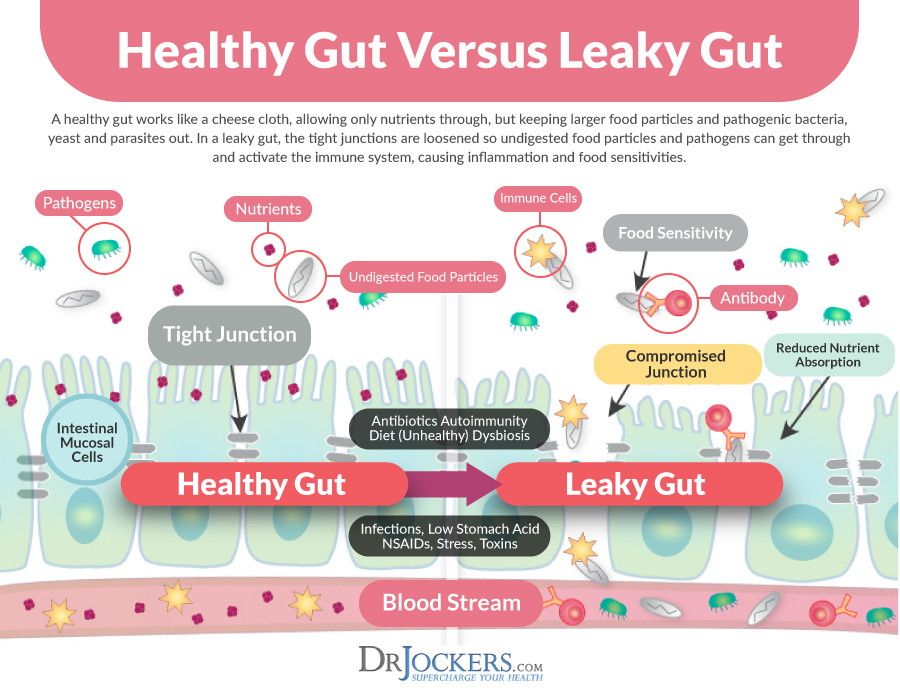
Gut Inflammation and Leaky Gut:
Systemic infection has killed more people in the history of mankind than anything else. The immune system is hardwired to fight to the death to prevent infection from dominating and destroying the body.
When the gut lining is damaged, it allows for large food particles, bacteria and environmental debris to get into the blood stream. This influx of foreign debris primes the immune system which mistakes these food particles for dangerous infectious microbes.
The primed up immune system goes out on a major assault on food particles, bacteria and toxins in the blood stream causing serious inflammatory activity that can cross into various tissues such as the joints, thyroid, brain, skin and the gut lining itself. This can result in all different forms of chronic disease and autoimmunity.
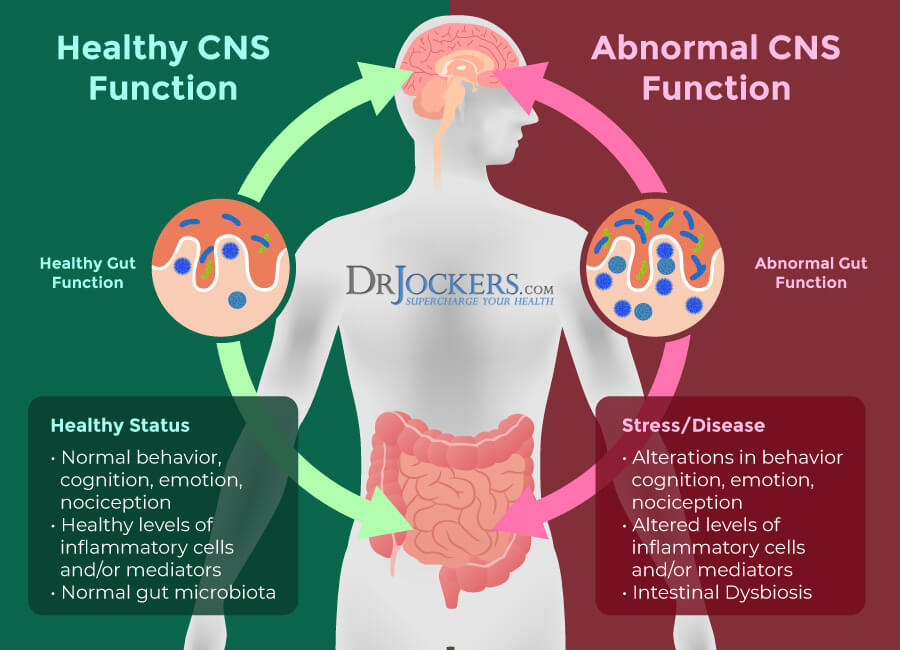 Conditions Underlying Leaky Gut Syndrome:
Conditions Underlying Leaky Gut Syndrome:
There are many conditions underlying leaky gut syndrome that I describe in this article. Some of the major factors that need to be addressed are the dysbiotic conditions of poor bacterial balance around the gut lining. This could be due to any of the following:
1) Small Intestinal Bacterial Overgrowth (SIBO): A condition described here which involved an overgrowth of bacteria in the small intestine. These bacteria break down food particles and create toxic debris, gas and inflammation.
2) Candida Overgrowth: Candida refers to a group of yeast species that are common to our intestines. With the proper conditions, these yeast organisms can take control of the gut membrane and other mucous membranes of the body and wreak havoc. You can learn more about Candida in this article here.
3) Parasites: There are many different parasites as described here that can make their way into the body and given the proper conditions they can take over control inside the gut. Once they take over control they steal valuable nutrients and release toxic chemicals that irritate our immune system and cause system wide inflammation.
How To Begin the Process:
The leaky gut protocol begins with a 3-5 day fasting cleanse called the reset phase. During this period the individual should consume organic broths. Bone broth provides a megadose of critical nutrients like gelatin and key amino acids that support the rapidly growing cells in the gut and soothe inflammation and scarring of the gut lining.
You can also use anti-microbial herbs such as oregano oil and peppermint oil in the broth to help reduce the microbial load in the gut. Herbal tea blends to help reduce microbial count (Pau D’Arco), improve digestive function (ginger and peppermint) and strengthen the gut lining (slippery elm) are all highly recommended.
Additionally the individual is recommended to drink water with raw apple cider vinegar (ACV) to help reduce microbial counts. The ACV is a powerful sterilizer that bad bacteria, yeast and parasites do not like. It helps to reduce their populations and improve the overall dynamics of the digestive system.
You can read more about the nutrition plan to heal leaky gut here
Reset Period:
During the reset period of the leaky gut protocol it is key for the individuals to consume organic acids and fluids so using apple cider vinegar and/or lemon in water is especially useful. It is also recommended to use herbal teas and coconut oil throughout the day. These will help strengthen the body through the fast and provide good clean fats and anti-oxidants.
Drinking pure aloe vera juice here can also be very healing on the digestive tract and can promote healthy bowel movements. On the leaky gut protocol it is important to be moving your bowels to prevent against toxic fermentation in the gut.
1) GI Clear:
This supplement is a blend of natural anti-microbials that have a powerful effect on reducing bad bacteria, yeast and parasitic counts. This is made up of berberine, barberry, black walnut powder, sweet wormwood and other anti-microbial herbs.
Mild Cases: 1 cap – 2x daily on an empty stomach
Moderate Cases: 2 caps – 2x daily on an empty stomach
Severe Cases: 3 caps – 2-3x daily on an empty stomach
I like to use this product through the whole 30-day Digestive Health Restoration program of the leaky gut protocol.
2) Proteo Enzymes:
Systemic enzymes are used to break down the protein layer of biofilm that is produced by bacteria to protect themselves. Biofilms are bacterial populations that adhere to each other and other surfaces within a self-produced extra-cellular matrix. The biofilm creates a pod-like intracellular bulge on the gut wall.
Biofilms offer bacterial and yeast species incredible survival advantages. These include the ability to horizontally transfer genetic material, shelter from environmental changes, protection from the host immune system, sharing of metabolic byproducts, tolerance and adaptability to antimicrobials.
Proteolytic enzymes disrupt these biofilms and make the bacteria more susceptible to the bodies immune system and the usage of anti-microbials and anti-biotics.
Normal Protocol: Take 3 caps in the morning on an empty stomach
Advanced Protocol: Take 6 caps in the morning on an empty stomach or as directed by your health care practitioner.
*This product should be taken at least 2 hours before or after consuming food for best results*

Improve Your Detoxification Systems:
When the body is overrun by bad microorganisms there is an overproduction of toxic metabolites that must be deactivated and eliminated by the body. When this is a chronic condition, it overwhelms the liver which causes increased whole body toxicity and immune dysregulation. This leads to higher inflammatory loads and possible auto-immunity or cancer development.
We use the thyroliver protect to help deactive metabolites. This product contains clinically effective doses of milk thistle, N-Acetyl cysteine, selenium and alpha lipoic acid that support phase I-II liver detoxification and protect the gut lining and kidneys.
Normal Protocol: Take 1 capsule – 2x daily, with meals (first and last meal)
Advanced Protocol: Take 2 capsules – 2x daily, with meals (first and last meal) or as directed by your health care practitioner.
Sweep Out the Toxic Debris:
As the microbes die off they release tons of toxic debris that inflames the body if it isn’t eliminated. The activated charcoal has millions of tiny pores that capture and bind materials in an absorbent manner, much like a sponge. Due to the absorbent qualities they can grab over 100 times their own weight in toxins.
Taking the activated charcoal during the leaky gut protocol helps my clients feel so much more comfortable during the healing process.
Normal Protocol: Take 2 Activated Charcoal in the mid-morning and 2 caps in the mid-afternoon (at least an hour away from food, supplements or medications)
Advanced Protocol: Take 4 capsules of Activated Charcoal in the mid-morning and 4 caps in the mid-afternoon (and an hour before/after other supplements or medications) or as directed by your health care practitioner.
Repairing the Gut Lining:
During the reset phase of the leaky gut protocol, while we are resetting the microbial load in our GI tract, we can begin the process of healing and repairing the gut lining. The Gut Repair product has compounds within it that enhance the repair of the gut lining.
I have found that individuals with severe SIBO may struggle with the arabinogalactan fiber within the Gut repair. Others thrive off of it during this 30-day program because the fiber helps to strengthen the gut microflora. If you struggle with fiber and higher FODMAPS foods than I would avoid it and use a pure L-glutamine instead.
Gut Repair: This is a blend of nutrients designed to heal and seal the gut membrane and replenish the mucosal membrane.
Moderate-Severe Cases – 3-4 spoonfulls daily Mild-Mod Cases: 1-3 spoonfulls daily
L-Glutamine:
On the leaky gut protocol, I will often times have some of my clients take additional L-glutamine which has a powerful effect on improving the healing of the gut lining. I have supplemented people with 30 grams a day with very good results. I am often very cautious however, as some individuals do not metabolize L-glutamine well and can overproduce neuronal glutamine levels and cause brain cell excitotoxicity.
The major symptom these individuals experience is increased, fatigue, anxiety and irritability when they consume L-glutamine. I typically have people start with 4-10 grams daily and then slowly go up 5 grams at a time while we monitor to see if any of these issues come about.
Strengthen Your Gut Defense:
Your intestinal system has its own immune system which is led by an immune compound called secretory Immunoglobin A (sIgA). sIgA protects against the overgrowth of bacteria, yeast and parasites within the intestinal environment. Its main job is to protect the gut lining from assault and reduce the risk of infection.
I find that many individuals who struggle with SIBO, Candida and parasites have reduced and altered levels of sIgA. As long as levels of sIgA remain low, it allows for an overproliferation of bad microflora and increased risk of gut irritation.
For certain cases, I use a high quality IgG supplement that improves sIgA levels which is the immune component of the gut membrane. This is very important for preventing future parasitic and/or yeast or bacterial infections.
This is a bovine colostrum product, which means that it is made from the special immunoglobins secreted during a cow’s first milking. Colostrum is one of the most immunosupportive substances on the planet. Most people with milk sensitivities do great with colostrum but I never give it to anyone who has an extreme allergy (anaphalaxis) just to be on the safe side.
You can read all about this product here
Severe: 2 caps of 500 mg – 2x daily Mild-Moderate – 1-2 caps of 500mg -1x daily
ReBuilding Phase:
As we move into the rebuilding phase of the leaky gut protocol, we want to support the digestive process and reduce stress on the digestive organs while maximizing nutrient absorption. Most people with leaky gut syndrome have problems with hydrochloric (HCL) acid production and pancreatic enzyme production.
Low HCL and enzyme production leads to poorly digested food particles. When these food particles are not digested well they create a breeding ground for pathogenic microorganisms who will metabolize them and create toxic chemicals, gas, etc.
Symptoms of Low Stomach Acid:
Low Stomach Acid:
One of the biggest things that I see associated with low HCL is low-energy shortly after eating a low-carb, higher protein meal. Before you begin the leaky gut protocol, do this quick test to see if you need to use HCL with your meals. Try eating 2 eggs or a piece of chicken and see how you feel over the next few hours. If you are sluggish and have digestive issues, it is most likely associated with low HCL and digestive enzymes.
I also review an at-home baking soda stomach acid test in this article that will help you understand if you have low-HCL. You can also take an HCL supplement with a protein based meal (6 oz or so of protein is best for the test) and see if you notice a burning feeling in your stomach (not in your upper chest – that is acid reflux and could be a sign of too low HCL). If you do, it is a sign you either have an ulcer or have too much HCL and do not need to supplement.
You can continue doing this until you notice the burning sensation. Then drop it by one cap and take that with each protein meal until you notice the burning again. So if 5 caps made you burn, try using 4 caps with each meal. I see many clients with severe digestive issues need 6-8 capsules of HCL until they notice the burning.
Using ginger, peppermint and apple cider vinegar in water throughout the day will help enhance HCL production and overtime as you are taking care of your digestive system you will be able to reduce the amount of HCL caps you need to properly digest your food.

Acid Prozyme:
Acid Pro-Zyme is formulated with a variety of compounds and is designed to support gastric acidity, digestion and normal gastrointestinal flora. Acid Pro-Zyme should be taken with, or immediately following a meal. Do not use if there is a prior history of, or a current complaint of, a peptic or duodenal ulcer.
Mild: 1-2 caps with each protein meal
Moderate: 2-4 caps with each protein meal
Severe: 4-6+ caps with each protein meal
Super D-Zyme:
Enzymes are extremely key for breaking down carbohydrates, protein and fatty acids and prepare them for proper digestion and assimilation in the body. Individuals with digestive challenges are often unable to produce sufficient quantities of digestive enzymes and are unable to effectively digest the food they are eating.
This is a great product to use daily as well as on the leaky gut protocol for a number of reasons:
- Includes a Wide Variety of Enzymes: Many different enzyme subtypes to give a wide array of effects and address all digestive enzymatic effects. This includes carbohydrate metabolizing enzymes, proteolytic enzymes and fat- metabolizing enzymes.
- Functions in a Wide pH Range: There are significant pH ranges in the stomach and small intestine. These enzymes are formulated to survive and thrive in a number of different ranges.
- BioAvailable Enzymes are Key to Reducing Intestinal Stress: Intestinal stress is a major contributor to the formation of leaky gut syndrome. Bioavailable enzymes reduce the stress on the gut and improve nutrient absorption.
Mild: 1-2 caps with each meal
Moderate: 2-4 caps with each meal
Severe: 4-6 caps with each meal
Soil-Based Probiotics:
The last step of the rebuilding phase is bringing in some low-impact, hypoallergenic spore-forming probiotics. Many individuals with leaky gut have trouble with lactobacillus strains of probiotics. For these challenging cases, I only use spore forming soil-based organisms and have found them to be extraordinarily well-tolerated and life-changing for these individuals.
The Prescript – Assist contains a proprietary formula of humic and fulvic acids that help support the growth and development of the good microbes within the intestinal tract. Both humic and fulvic acids are major organic constituents of soil, coal, streams, lakes and ocean water.
Humic substances are considered the most chemically active compounds in soil. Fulvic acid contains over 60 minerals and trace elements and is essential for cellular health. Humans always consumed these humic substances by consuming dirt on fruits and vegetables. Today, we wash and over sterilize all our produce and very rarely get any of these highly beneficial soil compounds.
These humic substances act as powerful electrolytes and anti-oxidants. They are also natural chelators that bind and pull out toxic substances such as pesticides, herbicides, bad microbes and heavy metals. There colloidal nature allows them to help the cells to more efficiently respirate, hydrate, absorb nutrients such as amino acids and eliminate wastes more effectively.
This combination of benefits allows for a healthier internal environment which enhances the probiotics ability to flourish. These substances provide a multitude of benefits but are currently classified as pre-biotics because of their beneficial effects on the gut flora.
Mild: Take 1 capsule daily away from meals
Moderate: Take 1-2 capsules 1-2x daily away from meals
Severe: Take 2+ capsules, 2x daily, away from meals
Additional Supplementation:
Adapt Strong:
I often see people with severe digestive issues that struggle with adrenal fatigue. During adrenal fatigue, the body cannot produce enough cortisol to keep them energized and active throughout the day. They often crash at points during the day and need to nap.
They often do not even respond to stimulants like caffeine because they have gotten to the point of adrenal exhaustion and are incapable of producing enough stress hormone to keep their energy up. This can also lead to lack of emotional control and depression.
Cortisol helps to reduce inflammation in the body. That is why cortico-steroids are prescribed to those with major inflammatory issues. When cortisol is stable, it keeps us energized and reduces inflammation. When cortisol is unstable and too low at periods of time during the day (or all day), we end up with increased inflammation. This inflammation impairs the digestive system’s ability to heal and rebuild.
As long as cortisol rhythm is out of balance, the gut will not fully heal and seal. If you are dealing with adrenal fatigue, you want to support your cortisol production while healing your gut. I use Adapt-Strong is my go to supplement to support the bodies ability to adapt effectively to stress, manage cortisol levels and support stable energy levels.
Mild Adrenal Fatigue: 1 cap – 2x daily (morning and afternoon)
Moderate Adrenal Fatigue: 2 caps – 2x daily (morning and afternoon)
Severe Adrenal Fatigue: 3 caps 2-3x daily (morning, afternoon, evening)
Putting This All Together:
I know this was a lot of info and you are probably wondering where to start on the leaky gut protocol If you can only afford one supplement, I would probably take the probiotics but it is different based on the unique factors involved in each case. Everyone is different and there is no leaky gut protocol that works the same for everyone.
This is what I find works well for most (80%) of the cases I have worked with and many of my colleagues have seen.
Reset Phase:
1) GI Regulator – Take for 1-6 months depending upon degree of microbial overgrowth. This supplement kills off bad microbes but also helps to balance blood sugar levels which is another key process in healing leaky gut. If one has a parasitic overgrowth, they may need a specific anti-parasitic supplement as well.
2) Proteo Enzymes: Take 3-6 caps 1-2x daily for 30 days to reduce inflammation in the body and break down bacterial biofilms.
3) L-Glutamine or Gut Repair: Beginning with 3-6 grams daily and working up to 20+ grams daily. This is a powerful support nutrient for rebuilding the gut lining.
4) Adapt-Strong: Help to balance stress hormone and improve cortisol regulation.
5) Thyroliver Protect: Helps to deactivate toxins and strengthen the liver.
6) Activated Charcoal: To help bind and sweep toxins from the colon.
ReBuilding Phase:
Continue to take the supplements from the reset phase of the leaky gut protocol. Add these 3 to improve digestion and help to rebuild the gut lining.
1) SBO Probiotic: Hypoallergic, soil based organism to begin the formation of healthy microbes to strengthen the gut lining and reduce the level of bad microbes.
2) Acid Prozyme: Taking this in the middle or right at the end of each protein containing meal is very important to ensure adequate digestion.
3) Super D-Zyme: Take this a few mins before you begin your meal to ensure proper digestion. Additionally, make sure you fully chew your food until it is fully liquid in your mouth which will help to take stress off of the digestive tract and reduce the need for enzymes.
ReInnoculation Phase:
Continue with the supplements on the leaky gut protocol above. Depending upon lab tests or recommendations from your functional nutrition practitioner you may decide to add in colostrum or Gut Defense. I like to start small and work to a larger dosage with this.
You may also want to add in core supplements such as fish oil, vitamin D3/K2 and anti-oxidant support. Additionally, if you have had a histamine intolerance, you will want to add in Allergy Defense.
After 30 Day Protocol:
At this point in the leaky gut protoco, depending upon how you are responding, some of these supplements can be reduced. I often will take people off of the GI Regulator, Proteo Enzymes and the Thyroliver protect at this point. If the individual tells me their energy is great all day, we reduce or remove the Adapt-Strong.
I typically recommend the individual stay on L-glutamine or gut repair for another month and acid prozyme, probiotics and the digestive enzymes for 3-6 months.
It is possible for one to come off of all of these if they were healthy enough to begin with and have a really good diet that is rich in bone broth, collagen protein and L-glutamine, fermented foods and drinks that are rich in probiotics and enzymes and use digestive bitters such as apple cider vinegar, ginger and peppermint to continually strengthen HCL production.
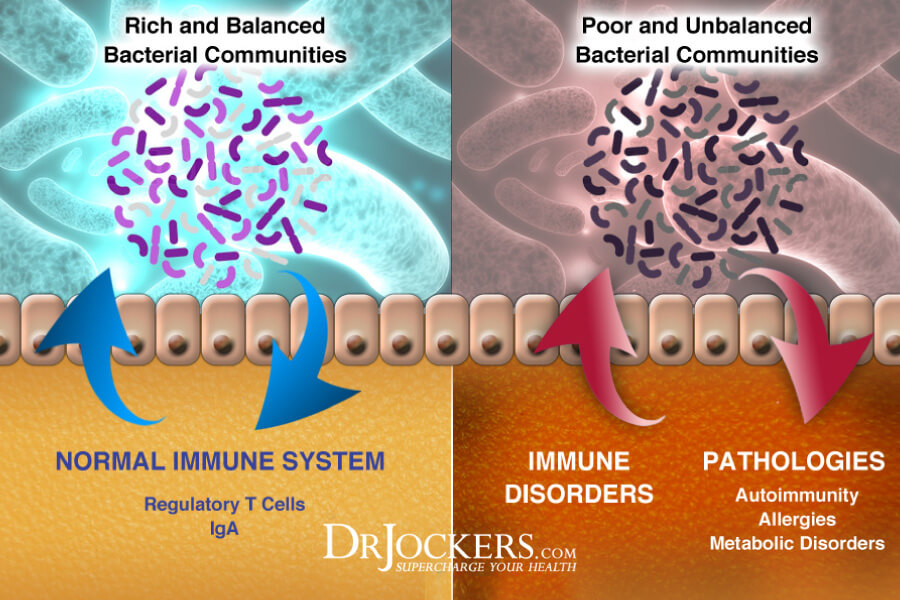


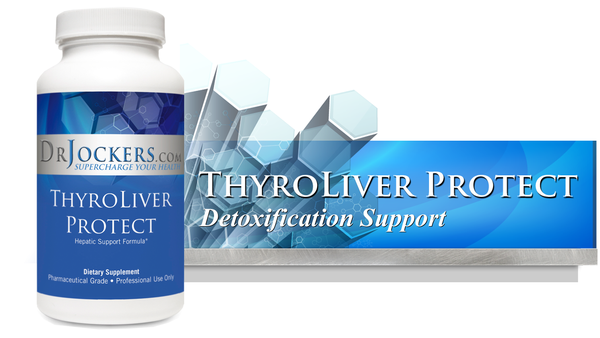
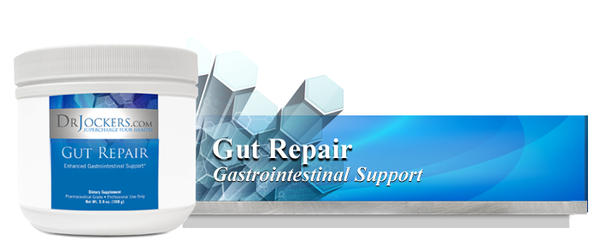
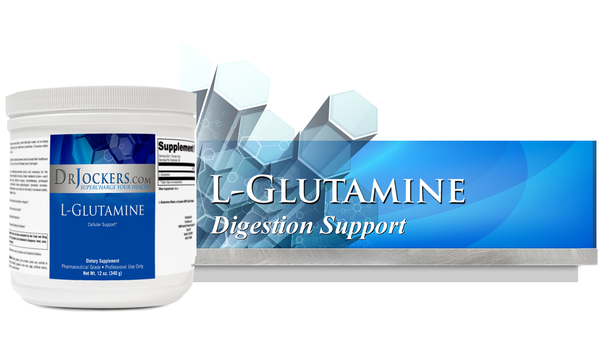
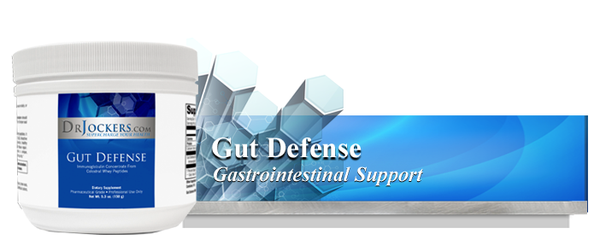
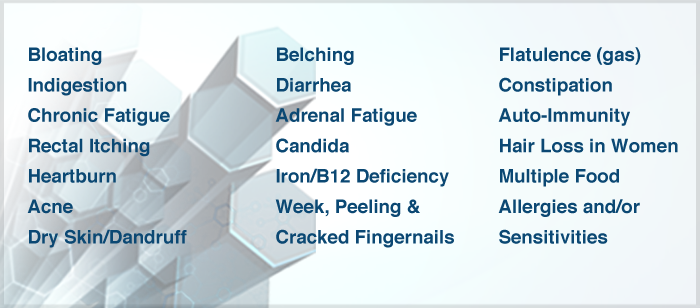
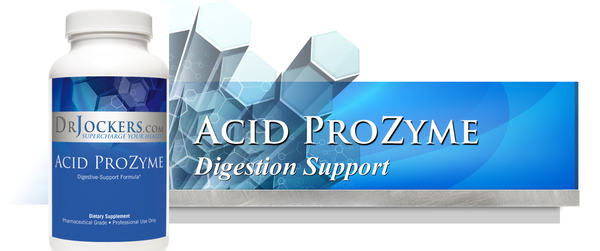
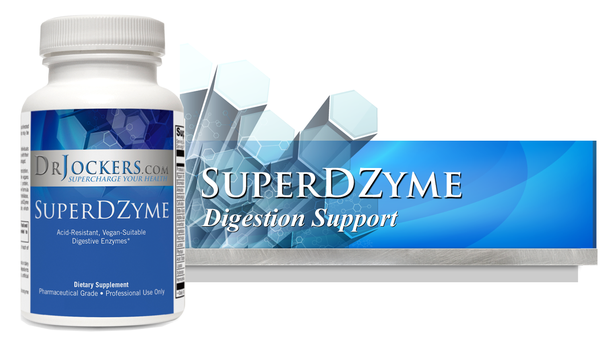
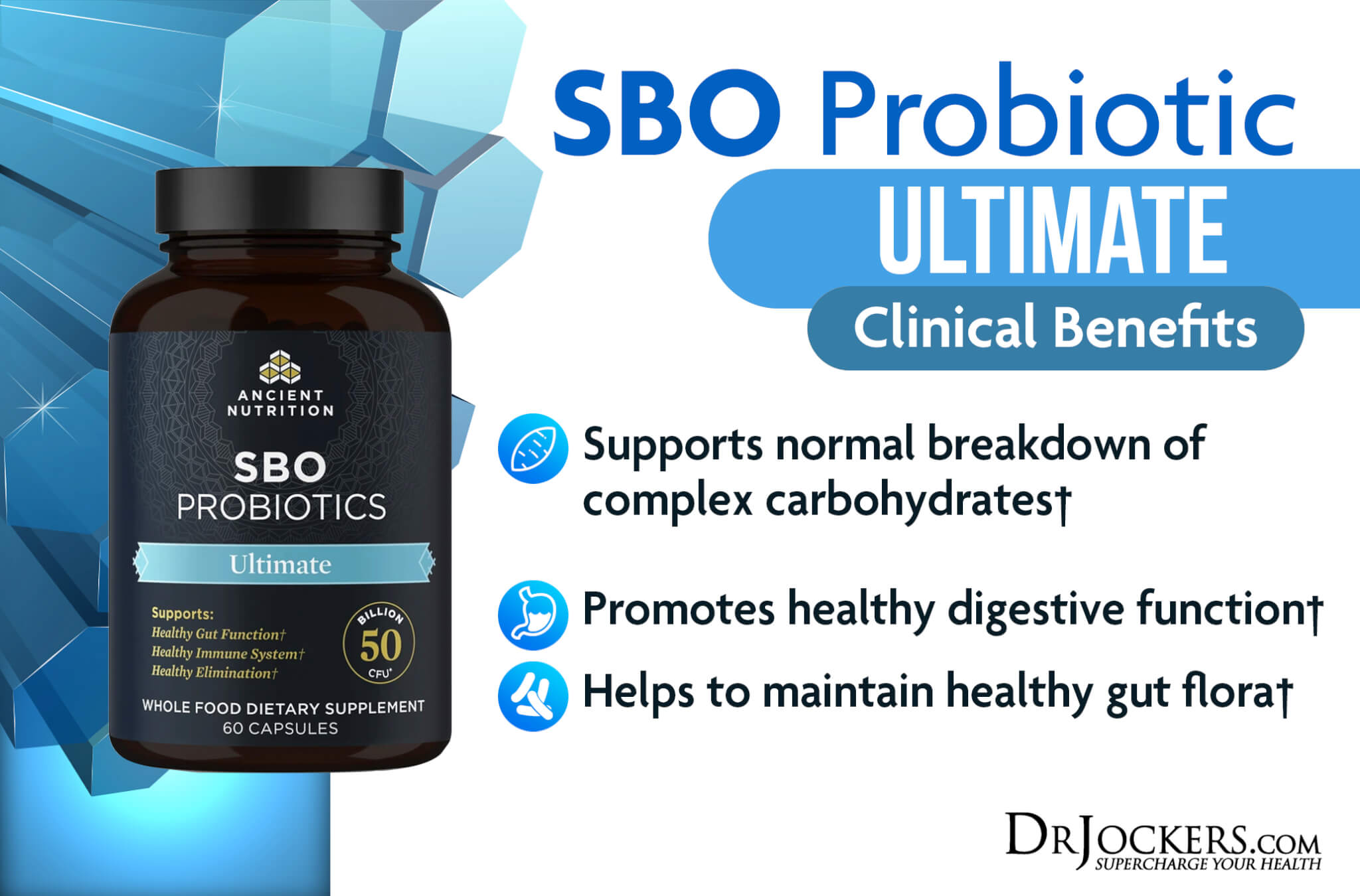
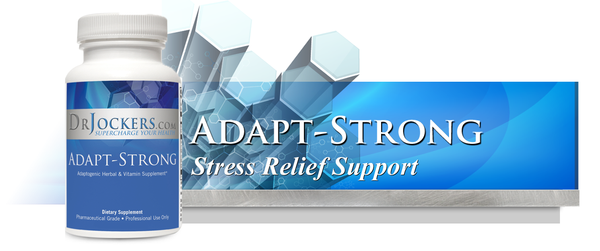



Good information! My dad, 79 yrs of age, has been battling the above for two years now. He has lost a considerable amount of weight, has watery, uncontrollable diarrhea and has had so many expensive tests run. He took 4 rounds of Remicade – each round making his condition worse.
When he was up at Johns Hopkins, they found an intestinal parasite. This didn’t surprise any of us as my parents have been serving overseas as missionaries in West Africa for 30 plus years. They gave him a round of antibiotics and basically said, “There ya go!” (Still fighting this just as strongly as before.)
It is my understanding that parasites don’t leave that quickly – and if there’s one, there are others. Reading the above diet, I can’t see my dad, at his age, able to go on such a severe diet. Is there another option to restore his gut flora and provide him relief?
I started reading this article, and was impressed by the information, but then was introduced to one product, and then another, and another… I’ve just mentally dismissed this article as one big clever advertisement.
Sorry you feel that way Ella. This article used to contain no product info but I got tons of questions about what products to take so I included that. Just trying to make it as user friendly as possible. Blessings!
God Bless you and your family for this selfless service in sharing useful knowledge.
No harm done in including links for useful products even if made by your company as everyone has a choice whether to buy your products or not. But if they choose to buy your products, they will have in hand well thought out formulations right from the start and that gives them an advantage.
But They are expensive products and out of reach for most – maybe that is something Dr. Jockers team can work on to see how to bring reasonably priced products so it is within reach of the common man.
Thanks!
I am a hepatocellular carcinoma survivor! Diagnosed 12-2006. I am alive today bc God sent me a Angel on Earth who had cured herself of terminal lung cancer! I am alive after chemo & being given maybe 30 days in Oct. of 2009. I am still here with my liver & appear to be cancer free, will no after next b/w.in Jan. but I do believe I have the leaky gut syndrome atleast it sounds like it! I have such a problem digesting food & be constipated all the time I take a lot of turkey ruhbarb & diet is all organic, no meats!! I do take Bl walnut wormwood & cloves daily along with other supplements but this is really sounding like my digestive problem. Can u give me any advice I follow u on fb! Love ur recipes!!!!
Thank you. I was clinically diagnosed with Celiac last August through a functional medicine doctor aka one that isn’t insurance controlled. I have numerous food allergies, hypothalmus dysfunction, pituitary dysfunction, stage 3 adrenal dysfunction, reverse T3 dysfunction, anaphylactic to food allergens when unknowingly contaminated and that’s just off the top of my head. Much of my treatment I have done myself. I put in over 1500 hours of research in 2014 alone. 2015 isn’t over yet, but I’m wagering another near 1000 hours this year. Many want you to pay to get this leaky gut information. I appreciate that you set out a leaky gut protocol and provided supplements that one can choose to buy or choose to get their own. When this is over, I’m so getting certified as a health coach or something so that I can help others. Thanks so much!
Thank you Mignon! Keep up the great work with your research and studies on leaky gut. Your tragedy will be your testimony and I believe you will help many people! Many Blessings!
I’m so incredibly happy I found this info. I am trying to heal SIBO and my body is terribly inflamed. I know I need to do something different and this seems to be what I’m looking for. I also like the product recommendations because I have been reading about many of these supplements individually. I plan to follow the fasting suggestions as well as use some of these supplements. Thank you Dr. Jockers! I’ll write back and let you know how it works for me.
Thanks for making this list suggesting products! This made it super simple for me! Hopefully I can get my gut healed soon!
Glad to hear that was helpful for you Justin! Looking forward to hearing about how your respond.
Awesome Justin! We are rooting for you!
This is fantastic information! Thank you Dr. Jockers! I have no gut discomfort, but I have been battling skin issues since my pregnancy (baby is now 17 months) and have some suspected food intolerances. My naturopath also suspects adrenal fatigue. I believe leaky gut is my root problem. So, my question, would it be recommended to do the 3-5 day broth fast if dealing with adrenal issues? I would say they are mild.
Hey Jenny, thanks for writing. A 3-5 day bone broth fast with herbal teas (like ginger/turmeric tea) can be very helpful. Be sure to take time to get a lot of rest, lots of deep breathing, light walking outside at the park, grounding your body if possible (barefoot on grass/dirt/sand when you are able) and lots of water to help flush your system. Also, using a high quality collagen protein can be very helpful during the fast. https://store.drjockers.com/products/collagen-protein-1?variant=6440663361
Excellent information! I really appreciate that Dr. Jockers replies to many of the questions on here. So many Doctors are too busy and the questions get left unanswered, leaving people confused and not knowing what to do next.
Thanks so much Laurie! The meaning of doctor is “teacher.” I believe the greatest thing doctors can do is teach people the necessary skills to understand the unique rhythms of their body and how to troubleshoot challenges and get well naturally.
This is excellent, thank you! I’ve spent the past eight months on a comprehensive protocol to eliminate parasites (successfully), and now I am starting to re-tackle leaky gut. My holistic doctor doesn’t seem to think much of fasting in general, but it has always seemed a good idea to me. My body doesn’t handle it very well, though – I think there may be too much yeast, my cravings are insane (and I can put up with a lot of discomfort). Also, bone broth/collagen makes me super bloated (on top of my already bloated abdomen). Any thoughts on fasting in this case?
Also, how strong is your GI Regulator? Do you recommend rotating it with other supplements? I’ve taken Agrisept and Berberine at times among an arsenal of other antimicrobials that my body has managed to adapt to over time, despite rotating them regularly. For me, yeast elimination seems to be the crucial piece to figure out before the rest of the protocol will work. I’m currently on a yeast/fungus formula from my doc and a couple of immune boosters (red bee propolis, cistanche). I’m also taking Interfase Plus and Lactoferrin to break down biofilm – is your product different from these? Based on urine odor, it seems to be working…
Hey Bonnie,
So sorry to hear about your health challenges. Often you need to work on balancing your adrenals before doing a fast. People that are unable to fast, have worn down adrenal glands. If the adrenals are worn out, the body will be unable to heal and produce sIgA which is key for keeping Candida under control.
I would focus on the adrenals first! The wobenzyme is excellent for breaking down biofilms and the GI reg works great as it is a combination of anti-microbial herbs.
Okay, thank you. Trying the Adapt Strong and GI Regulator to start with. I have done adrenal formulas in the past but not recently (there’s so much to heal…kidney issues, too…that sometimes it’s hard to know where to focus! But I believe leaky gut is the root of a lot of it.) I appreciate your timely response.
Thank you for the great information. I have been following your protocol for three months and saw a decrease in Candida symptoms;however, I have been extremely bloated lately. I am even getting stomach pains and very uncertain why with my super strict diet. Any thoughts Sir?
Sorry to hear about this Victoria! Here are some reasons and suggestions: https://drjockers.com/5-reasons-why-you-have-a-bloated-stomach/
I’ve been battling low hcl acid and Leakey gut for years. Last week I started sipping on apple cider vinegar with water and noticed a huge change. First day I took a sip every half hour. Second day, every hour. Third day, a sip before meals. It helped so much! I can actually eat without horrible gas and headaches. Just wow.
This is SO GREAT to hear Natalie! I would recommend also adding in ginger tea and aloe vera which can also really help your stomach acid production!
Thank you for all the info! I have been going down hill for the last ten years and didn’t know what the problem was. Can’t have dairy or gluten….I am anemic…Have lost weight…Poor absortion of vitamins. I started ACV..Bone broth …Kim chi, fermented pickles…Sprouted pumpkin seeds too! I have eliminated so many foods. I do take an adrenal supplement a couple times a week and B12 daily. I watched the 700 Club today and Teri gave a word on someone with gut problems…I believe that was for me and I am on my way to better health! God is good!
Wow, that’s amazing Theresa, Praise God!
What a comprehensive article! Thank you for sharing this. Finally someone that makes you feel like they know what they’re talking about.I’m about to start your suggested protocol. I just have 2 questions.
Regarding the length of each phase. Is the reset phase 30 days followed by another 30 days of the rebuilding phase + the reset phase supplements? Or is it 30 days all together? ( I understand some products are to be taken for longer periods).
Another question, I have had a Nissan fundoscopy surgery in my stomach that started all my symptoms 9 years ago, I undid the surgery 7 years ago which made me intolerant to gluten, dairy etc in addition to sulfur burps … so I think your treatment will help rebuild the balance in my system but can a deregulated system cause erectile distinction? If yes, should I add something to your protocol to help treat my ED or what’s the best thing in your protocol that will help with that?
Thank you Jimmy!
The Leaky Gut Protocol is about 90 days in total but you will notice that some of the supplements will overlap somewhat. For your second question I think you will notice a great improvement in all of the symptoms you’ve mentioned! This is a constant stressor on your body which can ultimately have a negative impact on your hormones. With its resolution, I would expect to see an improvement in your ED as well.
I have an Immune Deficiency that affects my body from producing IgG as well as IgA.
Am I still able to fix my leaky gut without IgA , I understand this plays such an important role
in gut health.
Thank you for all you information I feel this is a site where I can learn so much and trust the information given!
Thank you so much for this Protocol. Just started on it and already feel a difference (I have scalp psoriasis). My question is about vitamin supplements. I was taking D3 drops, and pills of Omega 3’s, Vit B Complex and powdered Vit C, all of which I stopped. I am into the Rebuilding Phase. When can I get back onto those supplements ?
You should be able to reintroduce them now Sharon. Try adding them back in one at a time and monitoring any symptomatic changes over several days to be extra safe.
I’m taking a women’s multivitamin called Ritual, do i stop taking that while using these supplements?
I am not familiar with this supplement but it should be no problem to take along with these!
Dr Jockers:
My name is Francisco, and I’m from Portugal.
I found your website today, and I’m amazed with the huge ammount of good information that you give.
I have a leaky gut problem, which caused me an autoimmune disease called lupus.
And so, I’m interested in some of your products to start the treatment.
But first, I need to know if you can ship overseas, and if yes, I would like you to tell me if you accept the Paypal payment method.
Thanks alot for your attention…
Francisco
Thanks Francisco, yes we do accept Paypal and we do ship oversees, although most countries have extra taxes and tarrifs that we are unable to anticipate. So just be prepared for that.
Is this protocol acceptable for kids under 12?
No, I would not do the bone broth fast for young kids but you can begin with the Rebuilding phase.
I am very impressed with your protocol for leaky gut
I live in N Ireland
Been struggling with Candida Leaky Gut and Eczema for many years
I had a 3 year struggle in my late forties
And became clear
Now 61 years I’m finding difficult
I wish I could follow your protocol
But would probably need supervision
Is there anyone in my country
North or South that you would recommend
I so much know that you are treating each person individually
Such great information
Hey Karena, I would recommend looking for a functional medicine practitioner in your area! Be Blessed!
I have suffered for over ten years chronic sinusitis since. What can I do to get rid of it for good?
Hey Marty, I am sorry to hear this! This article offers natural strategies for relief: https://drjockers.com/top-8-sinus-infection-natural-remedies/
Hi Dr. Jockers,
Thank you so much for sharing this information. Everything you state here makes perfect sense. I have had many health issues since I had an episode of massive bleeding from a stomach ulcer about seven years ago. I had no health issues prior to this episode. I was in hospital for around 2 weeks. The horrendous pain and bleeding continued for 3 days and I became anaemic. I required a blood transfusion and iron infusion and just pulled through. The doctors said they tested for infection however they couldn’t identify the culprit. The only thing I can attribute to this, I volunteered during the clean up of the Brisbane floods (Australia) the week prior. I must have caught some disgusting bug when we were cleaning up. I can’t imagine how many feral things were in that water and we did wear masks, gloves, long clothing, but obviously not enough to prevent catching something in my case. I started the two year long process of tests to try and figure out what happened but other than noticing a healing stomach ulcer on an endoscopy, no actual cause was provided. A long list of health issues ensued for me. Auto immune, too many skin issues to list – eczema, keloid scarring, hives, random swellings of my face and eyes, rashes that look like burns appear on my face and neck, allergic rhinitis, dust mite allergy etc as well as many very painful digestive issues replicating the initial episode but without blood (if I started to feel an attack coming on I would make sure to drink a lot of water and if I took “Eno” this made the attack over quicker), anaemia, intolerances. I tested positive for Helicobacter Pylori about two years ago and was subsequently mass dosed on antibiotics. I fell pregnant just after and endured a terrible pregnancy resulting in Eclampsia due to uncontrollable high blood pressure and a pre-term emergency caesarean (having seizures on the operating table) at 35 weeks. At about 6 months I was started on a regime of medication to control high blood pressure. By the time I had the cesarean I counted I was taking around 65 tablets a day. My baby and I just pulled through. I spent 3 months in hospital prior to the birth and 2 months following. My baby also spent 2 months in hospital. Around 1 year later I was stung by a stone fish which resulted in being mass loaded with antibiotics again in hospital for 3 days and also upon release. 2 months after this I suffered an impacted Wisdom tooth and required large amounts of anti inflammatory pain medication due to the complicated root system. ANYWAY I’m sure you get my drift without me telling my entire life story 🙂 Two weeks ago, unsurprisingly I became extremely nauseous followed by vomiting. I was zapped of all energy. I could not even care for my 2 year old for 3 days and I’m a single mum. Back to the doctor who put me on Ondansetron for nausea and 40mg of Nexium. This has quiet obviously fixed the symptoms. Of course, a quick fix for the doc’s and out the door. I’m so sick and tired of living this horrible half life. I have been diagnosed with Depression and have been taking 100mg Sertraline for almost 2 years. I know deep down all of this medication is masking the symptoms. I know its up to me to fix myself however being a single mother not receiving any support, financially it has not been possible. My daughter has started kindergarten which has provided an opportunity for me to work and earn some money. I don’t want to take these medications anymore. I will slowly taper the antidepressants once I begin a gut regime. But I guess my one question is…do I stop taking the Nexium immediately once I begin the regime? I am aware the symptoms will most likely return and I can put up with a reasonable amount but I still need to be able to care for my daughter. Any suggestions?
Sorry to hear about this! I would highly recommend finding a functional health coach to help you: https://drjockers.com/functional-nutrition-tips-to-find-a-great-health-coach/
Thanks Dr. Jockers! Much appreciated.
Dr. Jockers
I’ve been trying to restore my Low secretory IGA for a few years using the same products mentioned. You ever post testimonies for people who have had success with some of your products and specify the related illness that they were able to overcome. I never see enough testimonies.